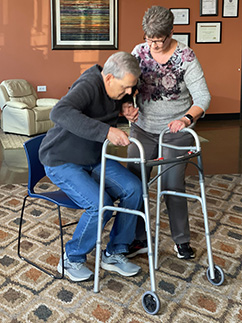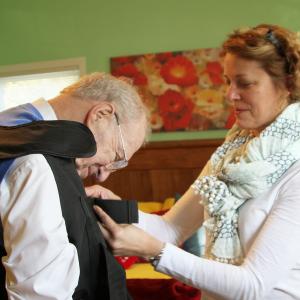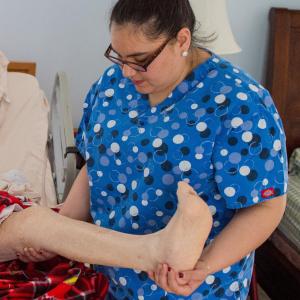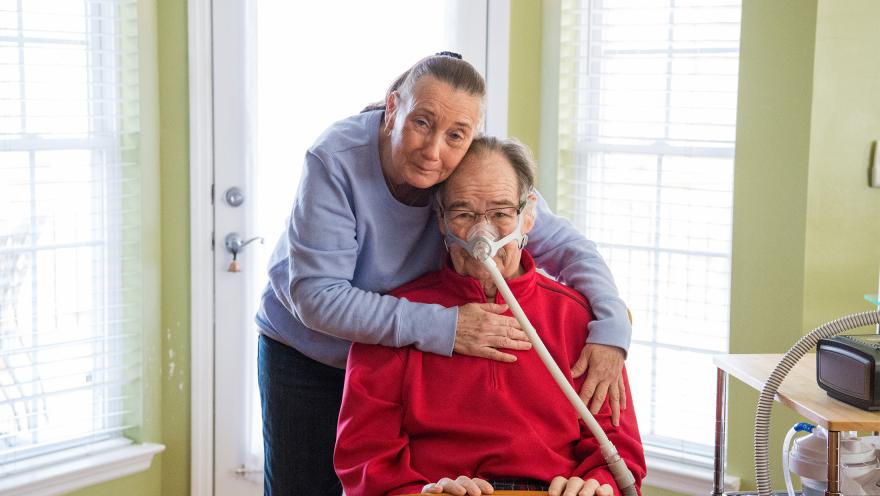People learn in different ways. Some like to study everything about a topic to understand it top to bottom, others pick and choose from a few trusted sources, and still others just dive right in and figure they’ll just learn by doing. What works for one person doesn’t necessarily work for another, but over time, most of us figure out the approach that we prefer.
For someone facing the daunting challenge of becoming an ALS caregiver, there are many paths to gaining the knowledge and experiences they need to care for someone with the disease. Regardless of how you prefer to learn, one thing everyone can benefit from is a reliable source of information, which can be found in the new ALS Association Caregiver Education Course.

“We know that people living with ALS require specialized caregiving support that can sometimes be complex due to the everchanging nature of the disease,” says Leslie Ryan, Senior Director, Community Education & Professional Competencies for The ALS Association, who helped develop the course. “And we also know that because ALS is a progressive illness, the responsibilities of the caregiver will change over time.”
Available to all caregivers, this free course was created with guidance from people who have lived the role and who have shared their journeys in hopes they can make the path easier for future caregivers.

Once registered, you’ll find a wealth of information allowing you to access an extensive list of ALS caregiving topics broken down into categories such as Mobility, Communication & Speech, and Psychosocial and Emotional Health. Each module includes detailed, specific lessons related to the topic. In total there are 11 modules with more than 80 individual lessons.
The course allows caregivers to tackle modules and lessons at their own pace and at the time that makes the most sense for them on their caregiving journey. In fact, there is a unique bookmarking feature to allow users to tag topics of particular interest, as well as the ability to add personal notes to lessons for reference and reminders later on.
Throughout the course experience, caregivers have access to videos and website links which will often tell a personal story that helps to validate the importance of the topic. Most modules also include a “Consider This” section to help learners appreciate the scenarios their patient may face, and identify their own choices if faced with a similar situation.

The course was designed to be of value to both family caregivers as well as professionals, and when the entire course is finished the user will receive a Certificate of Completion. “It was a great course, and (I am) looking forward to providing it to our employees,” wrote Christine, CEO of a home healthcare agency in California. “I want our employees to become certified.”
Even after completion, the course materials are available in a resource library to refer to and review as needed, providing an ongoing, trusted resource on your journey.
In memory of Robyn Glaser Goldstein, The ALS Association Caregiver Education Course was made possible through the generosity of her family and friends. Register for the course HERE.
November is National Family Caregivers Month, a time to recognize and honor the tremendous contributions of family caregivers. You can find more information on being and ALS caregiver HERE. You can find support in your community through your local ALS Association team HERE.
To continue to follow stories about people living with ALS in the community and learn more about the disease, subscribe to receive our weekly blogs in your inbox HERE or follow us at als.org/blog


Comments
I would like to learn about caregiver and I want to help seniors by taking care of them.
Hi Andreina,
You can learn about caregiving here: https://www.als.org/navigating-als/for-caregivers/caregiver-education-c…
Your local ALS Association care team may be looking for volunteers to help people living with ALS. Reach out to them to see how you can help: als.org/local-team
Join the conversation. Please comment below.